SME Finance Policy Guide
SME Finance Policy Guide
SME Finance Policy Guide
You also want an ePaper? Increase the reach of your titles
YUMPU automatically turns print PDFs into web optimized ePapers that Google loves.
60 GLOBAL PARTNERSHIP FOR FINANCIAL INCLUSION<br />
Facilitating Business Transactions through Public Trading Platforms: Chile Compra<br />
Chile Compra is a public, electronic system for purchasing and hiring that started operations in 2003. It is based on<br />
an internet platform and caters to companies, public organizations, and regular citizens alike. Currently, Chile Compra<br />
is the largest business-to-business site in Chile, with more than 850 purchasing organizations, including businesses,<br />
government ministries, public services, hospitals, municipalities, the military, the Lower Chamber of the Chilean<br />
Parliament, and universities.<br />
In an average month, 40,000 companies are registered and more than 150,000 business negotiations transacted. A<br />
total of 8,141 government employees use this system. During 2010, registered companies announced 365,397 purchases<br />
and issued 1,894,477 purchase orders. 2010 ended with US$6.5 billion in transactions.<br />
Registered companies are mostly microenterprises (68 percent of the total) and <strong>SME</strong>s (29 percent). Large firms only<br />
make up 3 percent. However, large firms provide 45 percent of the total volume purchased, <strong>SME</strong>s 37 percent, and<br />
microenterprises 18 percent. The share of micro and small firms is remarkable, as their participation in government<br />
purchases is double their overall share in the Chilean economy.<br />
The Chile Compra system is exposing some of the myths associated with the use of advanced technology, by actively<br />
involving everyday people, and low-income microenterprise operators, who are entering the electronic trade<br />
platform.<br />
Sources: Rioseco, and Andrés Navarro Haeussler. 2006. “Information and Communication Technologies in Chile: Past Efforts, Future<br />
Challenges.” Global Information Technology Report 2006, Hampshire: Palgrave, Macmillan. pp. 71–87. Analiza Chile Compra webpage.<br />
capital and decrease in liquidity. According to an<br />
OECD study, 65 43 percent of surveyed <strong>SME</strong>s in Belgium<br />
experienced extended delays in their receivables, and<br />
in the Netherlands 50 percent of <strong>SME</strong>s have to deal<br />
with longer payment terms from their customers. In<br />
New Zealand, the share of enterprises waiting over<br />
60 days for payment rose dramatically from 4.8 percent<br />
to 29.5 percent between February 2007 and 2008.<br />
Good Practices, Examples<br />
Governments can stimulate factoring and other sources<br />
of supply chain finance by creating a supportive regulatory<br />
and legal environment, such as electronic security<br />
and signature laws necessary for the quick and<br />
electronic sale of accounts receivable. Market structures,<br />
or platforms, can also be set up to facilitate<br />
supply chain and factoring transactions with <strong>SME</strong>s.<br />
Mexico’s NAFIN platform for factoring and value chain<br />
finance (outlined in section C.1.3), includes<br />
government invoices and contracts with <strong>SME</strong>s. NAFIN<br />
facilitates a form of “reverse” factoring, whereby <strong>SME</strong>s<br />
access finance based on the buyer’s creditworthiness,<br />
as well as access to earlier stage supply chain credit.<br />
<strong>SME</strong>s can also register as providers to the public sector,<br />
and access information, e-learning, and contracting<br />
opportunities through the NAFIN platform.<br />
In Chile, the electronic system for government purchases<br />
known as “Chile Compra” served as an important<br />
tool in the government countercyclical policy to<br />
support <strong>SME</strong>s. Chile Compra successfully addressed the<br />
objective of facilitating access of the domestic small<br />
companies to government purchases opportunities. The<br />
share of M<strong>SME</strong>s in the total volume of purchases<br />
increased from 49 percent in 2007 to 55 percent in<br />
2010. The share of <strong>SME</strong>s in government purchases is<br />
almost double the figures for the whole economy. Chile<br />
Compra contributed with savings of $180 million on<br />
government purchases and decreased suppliers transaction<br />
costs by $65 million in 2009. Further, the public<br />
65 The Impact of the Global Crisis on <strong>SME</strong> and Entrepreneurship Financing and <strong>Policy</strong> Responses. OECD 2009.



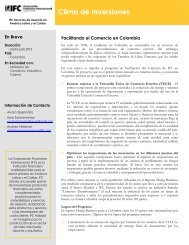
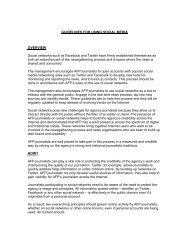
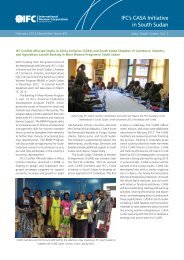

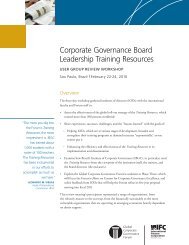




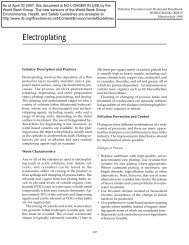

![Print a two-page fact sheet on this project [PDF] - IFC](https://img.yumpu.com/43449799/1/190x245/print-a-two-page-fact-sheet-on-this-project-pdf-ifc.jpg?quality=85)


